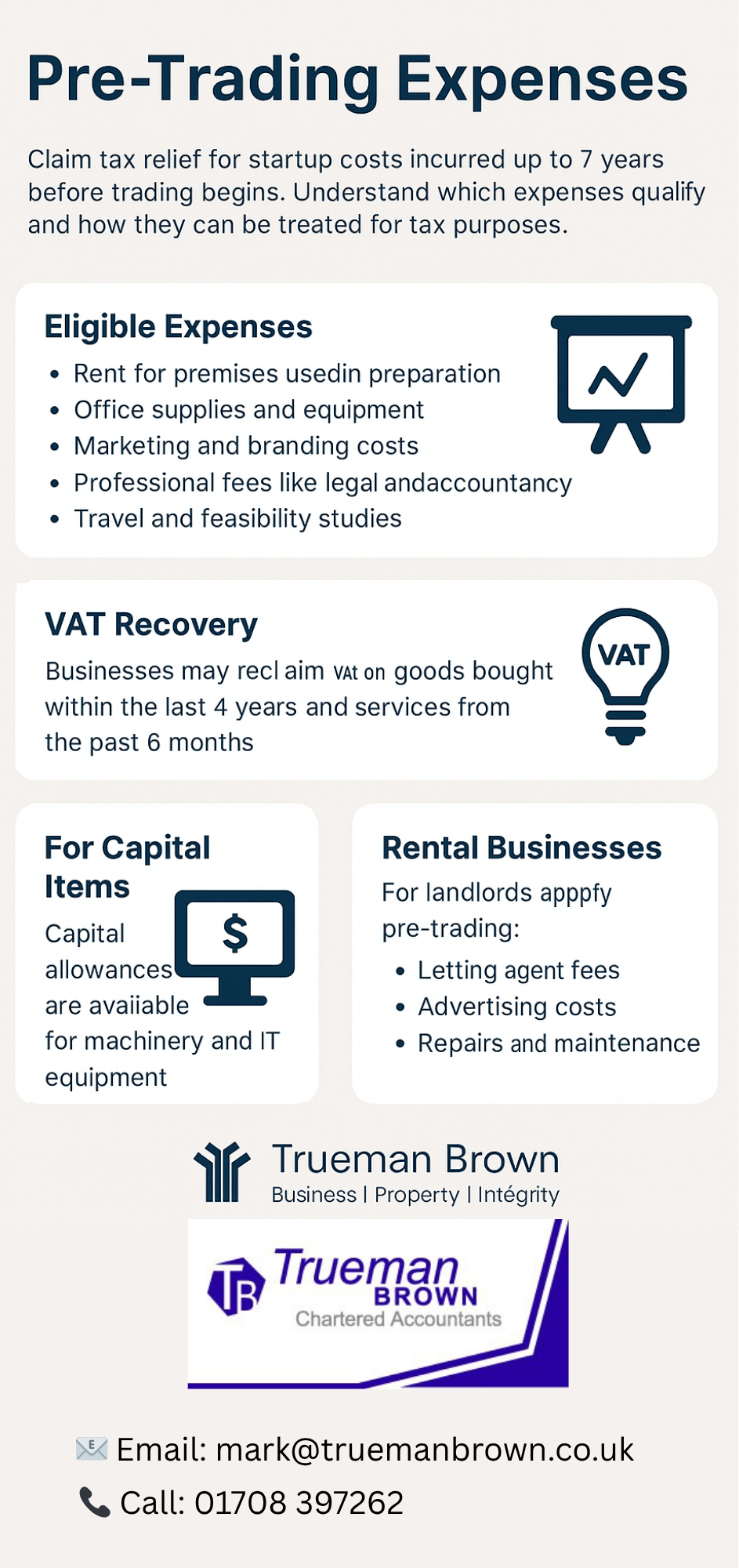Pre-Trading Expenses: What You Can Claim Before Your Business Starts
Starting a business involves upfront costs—often before you’ve earned a single pound.
These pre-trading expenses can include rent, equipment, marketing, and professional services
. Fortunately, HMRC allows tax relief on qualifying costs incurred in the seven years before trading begins, provided they meet specific conditions.
Understanding how to treat these expenses correctly can make a significant difference to your tax position.
What Counts as Pre-Trading Expenses?
Pre-trading expenses are costs incurred to set up your business before it officially starts trading.
Common examples include:
- Rent for premises used in preparation
- Office supplies and equipment
- Marketing and branding costs
- Professional fees (e.g. legal or accountancy)
- Travel and feasibility studies
To qualify for relief, the expense must be:
- Incurred within seven years before trading starts
- Wholly and exclusively for business purposes
- Not otherwise deductible
- Of a type that would be allowable if incurred after trading began
Capital Items and Pre-Trading Expenses
Capital purchases—such as machinery or IT equipment—aren’t treated as expenses but may still qualify for capital allowances.
Under section 12 of the Capital Allowances Act 2001, capital expenditure incurred before trading can be treated as incurred on the first day of trading, allowing relief through capital allowances.

VAT on Pre-Trading Expenses
If your business registers for VAT, you may reclaim VAT on pre-trading expenses:
- Goods (e.g. stock, equipment) bought up to four years before registration, if still held at registration
- Services (e.g. consultancy, accountancy) supplied up to six months before registration
You must hold valid VAT invoices and ensure the purchases were for business use.
VAT cannot be reclaimed on goods sold before registration or on services directly related to those goods.
Rental Businesses and Pre-Trading Expenses
Landlords can also claim pre-trading expenses for rental businesses. These might include:
- Letting agent fees
- Advertising costs
- Repairs and maintenance (if not related to personal use)
However, expenses incurred while living in the property or letting it below market rate may fail the “wholly and exclusively” test.
In such cases, deductions are limited to the amount of rental income received. Furnished holiday lettings have separate rules and must meet specific criteria to qualify.
Accounting Basis and Expense Treatment
The treatment of pre-trading expenses depends on your accounting method:
- Cash basis: Most expenses are deductible when paid
- Accruals basis: Capital items may qualify under capital allowances; timing of expense recognition is key
Choosing the right basis affects when and how relief is claimed, so it’s worth reviewing this with a professional.
Transferring Pre-Trading Expenses to a Company
If you incur pre-trading expenses as a sole trader and later incorporate, the company may not be able to claim those costs unless they were invoiced to the company.
One workaround is to provide freelance services to the company during setup and charge fees accordingly. This ensures the company can claim relief, avoiding a loss of tax benefit.
How Trueman Brown Can Help
Navigating the rules around pre-trading expenses can be complex—but you don’t have to do it alone.
At Trueman Brown, we help businesses and landlords identify qualifying costs, structure their setup efficiently, and maximise allowable reliefs.
📧 Email: 📞 Call: 01708 397262
Whether you’re launching a new venture or converting to a limited company, our team ensures your pre-trading costs are treated correctly and your tax position is optimised.
FAQs on Pre-Trading Expenses
Q: Can I claim pre-trading expenses if I haven’t registered with HMRC yet?
A: Yes, as long as the expenses meet the qualifying criteria and you register within the relevant timeframe.
Q: Are training courses deductible as pre-trading expenses?
A: Generally no, unless they directly relate to the trade and would be allowable post-trading.
Q: What happens if I don’t start trading after incurring expenses?
A: You won’t be able to claim relief unless the trade begins. Expenses remain personal costs.
Q: Can I claim pre-trading expenses for a side hustle or part-time business?
A: Yes, provided the business is set up with a view to profit and the expenses meet HMRC’s criteria.
